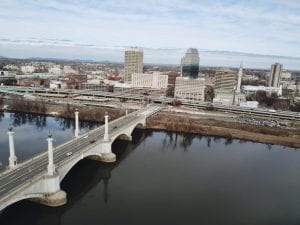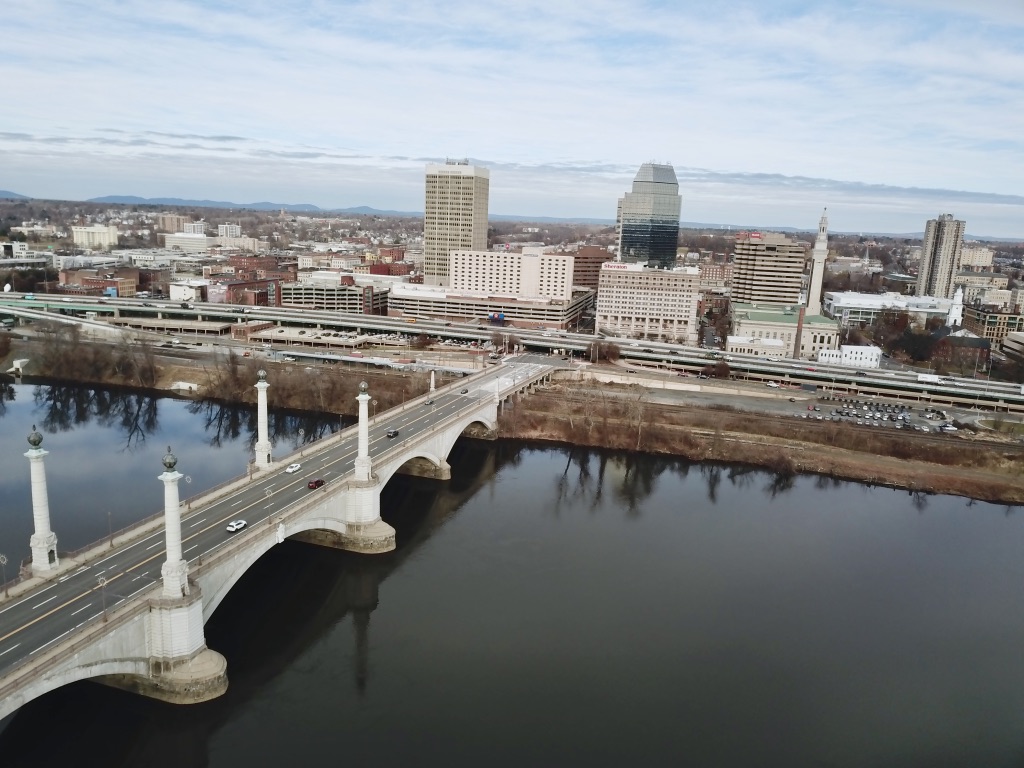
Caption: An aerial view of Springfield’s downtown skyline, in foreground is the Memorial Bridge spanning the Connecticut River. Regional public colleges and universities, such as Westfield State University, help drive the region’s economy, says Westfield State University president Ramon S. Torrecilha. (PATRICK JOHNSON / THE REPUBLICAN FILE PHOTO)
By Ramon S. Torrecilha
Westfield State University President
Regional public colleges and universities, such as Westfield State University, have long served as an essential gateway to a professional career, particularly for students who may have faced barriers to college enrollment. These institutions of higher learning also play another important role, one that is often overlooked: an economic engine for their host communities and regions.
Westfield State is the 10th-largest employer in Western Massachusetts, ahead of companies like Verizon and Berkshire Bank, according to Business West. And, except for the University of Massachusetts at Amherst, Westfield State employs more people than any other academic institution in this region.
Beyond our footprint as an employer, the university spent $12 million in fiscal 2019 for goods and services provided by primarily local companies. Seventy-three percent of Westfield State’s purchasing dollars are spent within New England’s Knowledge Corridor, which is a group anchored by Springfield as well as Hartford and New Haven that promotes the region through a variety of initiatives focused on business development, talent retention, advocacy and research.
Demonstrating our commitment to supporting the region’s agriculture, Westfield State University created in early 2016 a self-operated food services program, Westfield State Dining Services. Based on a farm-to-fork model, our successful and well-received dining services program emphasizes locally sourced and sustainable food options. It partners with more than 25 local food producers, providing our students, faculty, staff, and visitors with healthy meal options.
In addition to our employment and purchasing power, Westfield State plays a crucial role in the social and economic mobility of future area residents in that we train students for professions based in the region’s booming workforce. Through experiential education, we connect our energetic and eager-to-learn students with innovation-sector companies.

Westfield State University President Ramon S. Torrecilha. (Photo submitted)
More than 400 employers benefited last year from the services of more than 800 Westfield State interns. And, when these students graduate, they will be prepared with the hard-and-soft skills needed to embark on their careers. Whether it’s through web design or artificial intelligence, Westfield State University alumni make significant contributions to this region’s innovation economy.
Beyond technology, more than half of the degrees Westfield State grants are in the three sectors with the highest employment growth: health care; education; and human services. All three are struggling to meet demand due to workforce constraints, and Westfield State is making an important impact by preparing students to fill these jobs.
Westfield State also delivers innovative ways to bring a college education to local residents who might otherwise not have access to it. For example, among the greatest need in the health care sector is for nurses who hold a bachelor of science degree in nursing (BSN).
Nursing majors studying at a community college can become a registered nurse, but they cannot earn a BSN degree, which can be obtained only from a four-year college or university. Through articulation agreements with Greenfield, Holyoke and Springfield Technical community colleges, however, Westfield State enables students who complete their associate’s degree at one of these institutions to continue their education at Westfield State to ultimately earn a BSN. And, because 80 percent of Westfield State alumni stay close to home, we expect the majority of these graduates to take their skills to Baystate, Mercy or Cooley Dickinson hospitals, or to one of the region’s many other health care facilities.
Creating educated workers has significant ripple effects on the economy. A 2015 analysis by the Washington, D.C.-based public policy organization the Brookings Institution found that, “the average bachelor’s degree holder will spend an estimated $278,000 more on local goods and services than the average high school graduate over a lifetime. Local and state taxes will be $44,000 higher.”
In other words, people who earn more tend to spend more, and much of that spending is local. Our employees, for example, pump about $30 million into the regional economy.
An educated workforce perpetuates economic growth, and it is regional public universities like Westfield State that provide an education with fewer barriers and are accessible to many, even to those from families without a history of higher education.
While we are recognized for an exceptional education, accessibility, and the economic mobility that we offer our students, we are also proud of the contribution Westfield State University makes every day to our community and the economic vitality of our region.
Ramon S. Torrecilha is president of Westfield State University. To learn more about Westfield State, go online to westfield.ma.edu.






